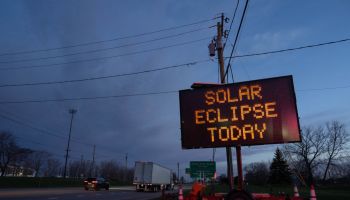VIA: CNN
In the middle of a snowstorm nearly a year ago, a planeload of 54 Haitian children landed in Pennsylvania as part of an airlift of orphans stranded by the powerful earthquake that devastated their country.
They were taken to Pittsburgh’s Holy Family Institute, where they were thrilled by the flush toilets, running water and plentiful food, said the institute’s president and CEO, Sister Linda Yankoski.
Their stay at the facility for troubled or abused children was supposed to be temporary, just until U.S. adoptive families took them in, she said.
Wednesday is the first anniversary of the Haiti quake, and by now most of those children have moved into adoptive homes, as have hundreds of others around the country who arrived in similar airlifts.
But many spent months in federal custody — some even experiencing their second winter detained in shelters in Pennsylvania and Florida, still waiting for their lives in America to truly begin.
“They are confused, they feel rejected, they wonder what’s going to happen to them and whether they are ever going to be with a family as they were promised,” said Michelle Abarca, a lawyer with the Florida Immigrant Advocacy Center, which is representing some of the children who were taken to Miami.
“They faced rejection in Haiti, rejection here. It’s all rejection.”
The children’s complex legal status unfolded because they were airlifted out of Haiti in the midst of a crisis, believed to be orphans in the process of being adopted by U.S. parents. The plan was to finish the adoptions in the United States, an unusual exception to international adoption protocol.
But once the children were in the United States, it quickly became clear not all of them were orphans already matched with U.S. families. Even for those who were, completing adoptions from so far away had obstacles.
“I believe it was done with the best of intentions,” said Cheryl Little, director of the Florida Immigrant Advocacy Center. “But we are challenged as never before to determine what’s in the best interests of the child.”
The airlifts were a humanitarian gesture prompted by an outcry over conditions at Haitian orphanages after the earthquake. The 54 children taken to Holy Family were typical — they had been stranded at the BRESMA Orphanage in Haiti’s capital, Port au Prince, run by two sisters from Pittsburgh, Jamie and Ali McMutrie.
Using social media, the sisters told dramatic stories of babies exposed to the elements, being rocked by aftershocks, living without food and water. Pennsylvania Gov. Edward G. Rendell heard the appeal and enlisted the Obama administration to help airlift the children to Pittsburgh.
In all, the United States granted 1,090 children, including the 54 in Pittsburgh, what it calls “humanitarian parole,” effectively permission to enter and stay in the United States on special visas while their U.S. adoptive parents complete the paperwork here, rather than abroad as is usually required.
“Massive deaths, that’s what would have happened if they had not gotten humanitarian parole,” said Diana Boni, director of All Blessing International, the adoption agency that works with the BRESMA orphanage.
“I would estimate that about 50 percent of the children (who) were airlifted out … would have died. All the agencies were struggling to even get food to children in all the orphanages.”
About 400 children immediately moved in with U.S. families trying to adopt them, said Jeffrey Kelley, spokesman for the U.S. Department of Health and Human Services.
But HHS ended up with custody of another 660 children as their complicated legal situation was sorted out. They were placed in foster homes or shelters used for children who enter the country illegally.
A string of government agencies was able to get most of them placed with adoptive parents or in foster homes in days. But a few dozen remained detained in shelters over the course of the year for a variety of reasons:
• Some children did not have firm commitments from U.S. adoptive parents.
• In about a dozen cases, the U.S. adoptive parents changed their minds and returned the children to shelters.
• In other cases, the biological parents in Haiti had not finished paperwork declaring they were giving up their children for adoption, or the paperwork was missing.
• The Haitian government slowed the adoption process further after one group of Americans was arrested for trying to illegally depart the country with children.
Eventually, one by one, all but 15 of the children moved in with families.
In the case of the 54 who arrived in Pittsburgh that snowy night, HHS contracted with Holy Family Institute to care for them. In turn, Holy Family hired staff who spoke Creole and arranged trauma counseling for the children, along with weekly phone calls to their biological families, Yankoski said.
The children began to go to school and learn English as they waited, living in a 5,000-square-foot home segregated from the delinquent children who usually make up the institute’s population.
At first, the adoptions moved quickly, but 12 were still at Holy Family for Christmas.
To read more go to: http://www.cnn.com/2011/US/01/11/haiti.us.orphans/index.html?hpt=C1











